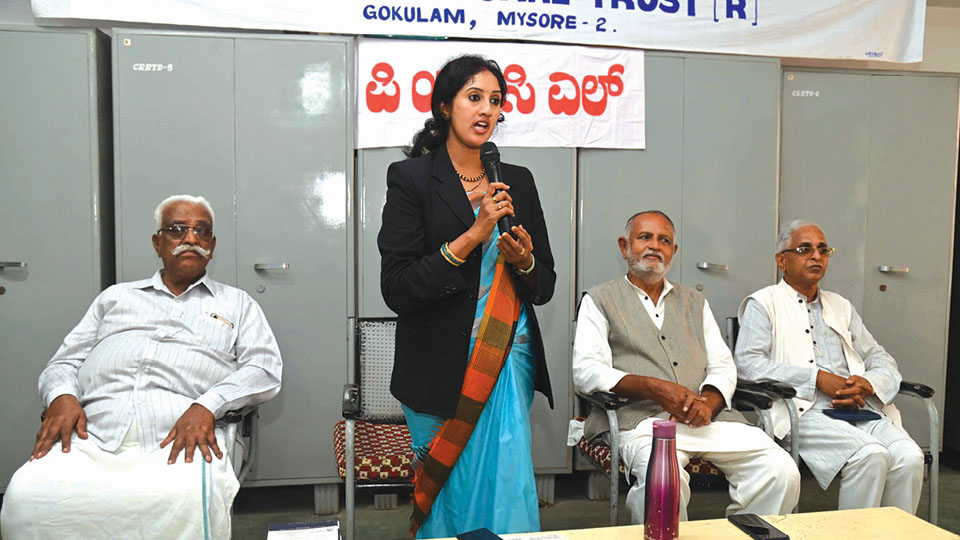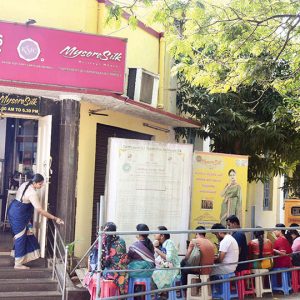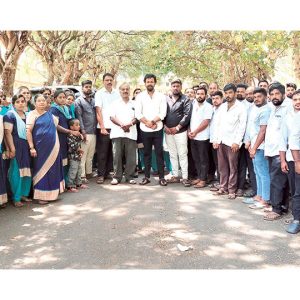Mysore/Mysuru: The inclusion of community service as a form of punishment in the Bharatiya Nyaya Sanhita 2023 (BNS 2023) marks a progressive step towards a more balanced and rehabilitative criminal justice system in India, opined Dr. A.R. Prakruthi, Advocate and Assistant Professor at Vidyavardhaka Law College.
Delivering the special lecture on ‘New Criminal Laws 2024 – An Overview’ organised by PUCL (People’s Union for Civil Liberties) at Shyagale Shivarudramma Trust’s Shyagal House in Gokulam Second Stage recently, she said that by focusing on restorative justice, the BNS 2023 aims to create a system where offenders can make positive contributions to society.
It promotes their rehabilitation and reduces the burden on the prison system. This approach not only benefits the offenders but also the community at large, fostering a more inclusive and constructive approach to justice, Dr. Prakruthi said.
“Community service is a form of punishment that requires offenders to perform unpaid work for the benefit of the community as part of their sentence. Community service as a form of punishment has been introduced under the Bharatiya Nyaya Sanhita, 2023. This represents a shift towards restorative justice, emphasising rehabilitation and reintegration of offenders into society rather than purely punitive measures,” she explained.
The amended law includes provisions for community service in cases such as attempted suicide, unlawful trade by public servants, minor theft, public intoxication and defamation.
Can contribute to society
“Offenders involved in minor offences can avoid traditional punishment by performing community service. Community service is designed to hold offenders accountable for their offensive acts, provide a means for offenders to contribute to society, reduce the burden on the prison system and promote rehabilitation and reintegration of offenders,” she said.
However, all offences do not attract this type of punishment. Community service is typically reserved for minor offences, non-violent crimes and first-time offenders. This ensures that the punishment is proportionate to the crime. Judges have the discretion to impose community service based on the nature of the offence, the circumstances of the case and the background of the offender, she said.
Time limit for criminal proceedings
The Bharatiya Nagarik Suraksha (Second) Sanhita, which has replaced the Cr.PC, prescribes a time limit for the initiation of criminal proceedings, arrest, investigation, filing of chargesheet and proceedings before the magistrate, which is aimed at speedy delivery of justice and a high conviction rate. The time-bound procedure has been added in 35 clauses of the law, Dr. Prakurthi said.
“The first information report (FIR) has to be registered within three days after receiving a complaint and in cases with seven to 14 years of imprisonment, the preliminary inquiry will have to be done within 14 days. The search and seizure report will have to be sent to court within 24 hours. “Earlier, there was no time limit for medical examination of rape victims, now the medical report will be submitted to the Court within seven days,” she noted.
Also, chargesheets would have to be filed within 90 days. Magistrates would have to take cognisance within 14 days and the framing of charges should be done within 60 days from the date of the first hearing, she added.
Crimes against women and children
“Crimes against women and children have been given priority. The Bill proposes changes in the provisions related to rape of women below 18 years of age, made punishable by life imprisonment or death.
It makes gang rape of minor women consistent with POCSO (Protection of Children from Sexual Offences Act). It proposes 20 years imprisonment or life imprisonment in all cases of gang rape. A new crime category of gang rape of a woman under 18 years of age has been added,” she said.
The new criminal laws ensure targeted penalties for persons fraudulently engaging in sexual intercourse or promising to marry without true intention to marry.
PUCL District President Prof. K. Kalachannegowda, progressive thinkers N. Diwakar and Purushotham were present on the occasion.
A broad overview of new laws
The Bharatiya Nyaya (Second) Sanhita has 358 Sections, instead of 511 Sections in the IPC. As many as 20 new crimes have been added and imprisonment has been increased in 33 crimes.
The Bharatiya Nagarik Suraksha (Second) Sanhita has 531 clauses, in place of 484 clauses in the CrPC. A total of 177 provisions have changed, nine new clauses and 39 new sub-clauses have been added, and 44 new provisions and clarifications have been added. Fourteen clauses have been repealed.
The Bharatiya Sakshya (Second) has 170 Sections, instead of 167 Sections in the Indian Evidence Act. A total of 24 Sections have been changed. Two new Sections and six sub-sections have been added and six Sections repealed.








Recent Comments